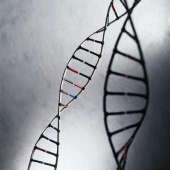
TUESDAY, March 19 (HealthDay News) — Children who inherit certain variations in four particular genes have an increased risk of developing childhood leukemia, a new study says.
The researchers also found that Hispanic children are more likely than white or black children to inherit high-risk versions of two of the genes that can lead to acute lymphoblastic leukemia (ALL).
Rates of ALL are higher in Hispanic children than in white or black children, and these findings point to at least one reason for that difference, according to the St. Jude Children’s Research Hospital-led study.
Children inherit two copies of each gene, one from each parent. That means that children could inherit up to eight high-risk versions of the four genes linked to an increased risk of ALL, the researchers said.
Children with more than five copies of the risk genes were nine times more likely to develop ALL than those with no more than one copy, according to the study published online March 19 in the Journal of the National Cancer Institute.
The study included nearly 2,500 children with ALL and nearly 11,000 without the disease.
“ALL is a complex disease that likely involves many genes. The discoveries we are reporting in this paper are an important step forward in terms of understanding why children develop ALL in the first place, particularly for those with African or Hispanic ethnicity. However, this is probably still just a small part of the complete picture,” study senior author Jun Yang, an assistant member of the St. Jude Department of Pharmaceutical Sciences in Memphis, Tenn., said in a hospital news release.
This year, about 3,000 children in the United States will be diagnosed with ALL, which is the most common childhood cancer. It is also among the most curable.
More information
The Nemours Foundation has more about acute lymphoblastic leukemia.

